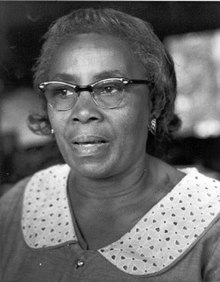Septima Clark
| Septima Poinsette Clark | |
|---|---|
 |
|
| Born | May 3, 1898 Charleston, South Carolina, USA |
| Died | December 15, 1987 (aged 89) Johns Island, South Carolina, USA |
| Organization |
NAACP SCLC |
| Movement | American Civil Rights Movement |
| Spouse(s) | Nerie David Clark |
| Awards | Martin Luther King, Jr., Award 1970 Living Legacy Award 1979 Drum Major for Justice Award 1987 |
Septima Poinsette Clark (May 3, 1898–December 15, 1987) was an American educator and civil rights activist. Clark developed the literacy and citizenship workshops that played an important role in the drive for voting rights and civil rights for African Americans in the American Civil Rights Movement. Septima Clark's work was commonly under appreciated by Southern male activists. She became known as the "Queen mother" or "Grandmother" of the Civil Rights Movement in the United States.Martin Luther King, Jr. commonly referred to Clark as "The Mother of the Movement". Clark's argument for her position in the Civil Rights Movement was one that claimed "knowledge could empower marginalized groups in ways that formal legal equality couldn't."
Clark was born in Charleston, South Carolina in 1898. Her life in Charleston was greatly affected by the era of Reconstruction, as well as power relations during the time. Charleston was strictly segregated and harshly divided by class. Her father, Peter Poinsette, was enslaved at birth on the Joel Poinsette farm between the Waccamaw River and Georgetown. Joel Roberts Poinsett was a distinguished US politician of his time and the namesake of the Poinsettia plant. Peter was a house servant to Joel and his main task was taking the children to and from school each day. After slavery, Peter found a job working on a ship in the Charleston harbor. During one of his travels, he went to Haiti and it was then that Peter met Victoria, Clark's mother. The couple got married in Jacksonville, Florida and then moved back to Charleston. Her mother, Victoria Warren Anderson Poinsette, was born in Charleston but raised in Haiti by her brother, who took her and her two sisters there in 1864. Victoria Poinsette had never been enslaved, and vowed to never be anyone's servant. She returned to Charleston after the Civil War and worked as a launderer. She raised her children very strictly, only permitting them to play with other children on one day of the week. She was also determined to make her daughters into ladies, so she told them never to go out without gloves on, never yell, never eat on the street, etc. Victoria Warren Anderson Poinsette lived in a constant struggle of wanting to improve her social class; she wanted to live in a middle-class society, but on a working-class budget. Victoria made it well aware to Peter that he was not providing enough for her and their family. Victoria raised her children separated, with the boys having more lenient rules than the girls. The boys could have friends over and play many days of the week, but the girls had to do chores and lessons, every day other than Friday. Clark rebelled against her mother's strictness through never becoming the lady she wished her to be and marrying a man Victoria called a "stranger". Clark remembers only ever being punished by her father when she did not want to attend school; however, Clark's father was not able to write his own name until the later years of his life.
...
Wikipedia
